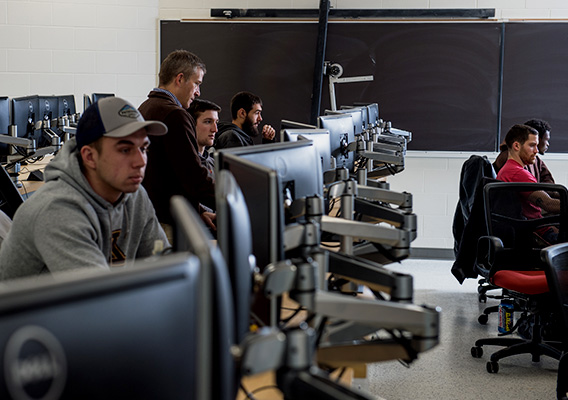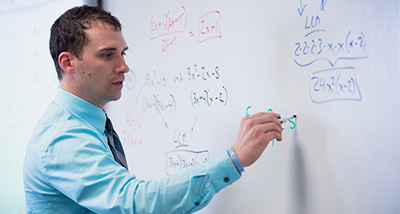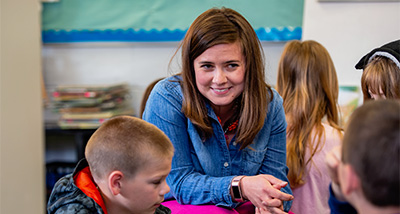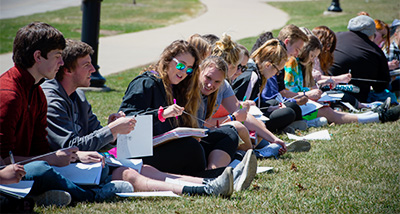
Why Study STEMteach?
Graduate | Education/Science | CEBAH
Please note, we are not currently admitting new students to the STEMteach program. We are working through a curricular redesign of the program to better align with new Wisconsin licensing standards. Our next anticipated cohort start date will tentatively be summer 2025. Please email pamela.bowen@uwrf.edu if you would like to be added to the list of interested candidates.
UWRF's graduate certification with optional master's degree will prepare people with science, technology, engineering and mathematics (STEM) degrees to become math, computer science or science educators in middle schools and high schools. Courses were developed in collaboration with the UTeach Institute at the University of Texas at Austin. STEMteach students begin the program in the summer of each year and continue throughout the academic year to finish in the spring.
This program is the first UTeach-inspired program in the upper Midwest. The UTeach model is designed to increase the number of STEM program majors interested in becoming secondary science or mathematics teachers. Candidates with expertise or training in a content-specific subject such as mathematics, biology, physics, chemistry, or computer science obtain the preparation and hands-on experience to gain an initial teaching license in secondary education.
Who is this program designed for?
- STEM program graduates or working professionals in STEM-related fields with an interest in obtaining a teaching license.
- Undergraduates finishing a STEM major who want to add teaching credentials to their degree.
- Graduates who want to pursue STEM teaching and a Master of Science in Education degree.
Program Details
- Provides a rigorous, yet streamlined pathway to an initial teaching license with optional master's degree.
- Qualified teacher candidates will complete their course requirements within one calendar year.
- Gain opportunity for STEM teacher experiences in early classes.
- Pay one tuition rate for your certification classes, regardless of where you live.
- Complete graduate-level coursework with a small (20) cohort of students.
- Curriculum is based on the nationally renowned UTeach program.
- Financial aid, including tuition reimbursements and scholarships, may be available.
Students will take courses in a cohort fashion beginning in the summer and continuing throughout one academic year, including the January term.
Required Courses (24 credits)
UTCH 701 STEMteach: Steps 1 and 2, 3 credits
UTCH 702 Knowing and Learning in Math and Science, 3 credits
UTCH 703 Classroom Interactions, 3 credits
UTCH 704 Project-based Instruction, 3 credits
UTCH 705 Teaching STEM Reading in Secondary Schools, 3 credits
UTCH 706 Functions and Modeling, 3 credits
UTCH 707 Perspectives in Math and Science, 3 credits
UTCH 708 Apprentice Teaching Seminar, 3 credits
Required for Teaching Certification (6 credits)
UTCH 709 STEM Apprentice Teaching for Secondary and Middle Grades, 6 credits
Licensure Requirements
The number and type of licenses that may be earned will depend on the candidate's undergraduate major, graduate electives and scores on general knowledge science exams.
Those seeking teaching licenses for Minnesota or other states should confirm the fit of this program's curriculum with the requirements of their chosen state. For more information on teaching licensing and basic skills and content area exams, see the Education Preparation Program web site.
Master of Science in Education Degree
You may also choose to complete a master of science in education degree in secondary education by completing one of the following options in addition to the courses listed above.
Thesis, 6 additional graduate credits (30 total credits)
TED 799 Thesis, 3 credits (or a science, technology, or math 799 class at 3 credits)
Oral or written comprehensive exam
Research Paper, 6 additional graduate credits (30 total credits)
TED 780 Professional Development Practicum, 3 credits
Choose one of the following area electives:
Independent Research (BIOL 798, PHYS 798, MATH 798, GEOL 798, or TED 798; 3 cr)
Oral or written comprehensive exam
Capstone Experience, 10 additional graduate credits (34 total credits)
10 credits of approved graduate coursework
Follow this checklist to ensure that your application process is accurate and complete.
- Schedule a conference with the program coordinator to review your qualifications for admission and teaching licensure, determine if additional coursework is required and to have any questions answered. Bring unofficial transcripts, course catalogs, resumes and any other documents that could be helpful.
- Apply online with the electronic UW System application form and pay the application processing fee. You may apply anytime but all candidates will begin with the summer term.
- Complete the worksheet required for your teaching license. Download forms here or contact the program coordinator for assistance.
- Request transcripts from your past colleges or universities. These official documents must be sent directly from the institution to UWRF Graduate Admissions, 103 David Rodli Hall, 410 S. 3rd Street, River Falls, WI 54022.
- If necessary, schedule and complete a basic skills exam approved by the Wisconsin Department of Public Instruction (DPI), for example ACT, SAT, GRE, MN NES Essential Basic Skills (EAS), or Praxis Core. Send your scores to our Admissions Office by June 1 by selecting UW-River Falls as the recipient.
- Schedule and complete the subject area exam required for your state license. If you are unsure which exam to take, speak with the program coordinator. Send your scores to our Admissions Office by September 1 by selecting UW-River Falls as the recipient.
- Find out your eligibility for financial aid and scholarships by visiting the Financial Aid webpage or contacting the Financial Aid office at 715-425-3141 or finaid@uwrf.edu.
After admission, you will receive instructions on how to register for classes. If you are admitted under probation, you will be advised on the conditions you must meet to move off probationary status.
NOTE: A criminal background check is not required as part of the application, but will be required for all accepted students prior to formal admission. Accepted students will receive an email from the College of Education, Business and Allied Health Associate Dean about this process. Indications of any criminal history on the background check are not considered in the application review process but may require a meeting with the college Associate Dean. Additionally, the program cannot guarantee any graduate an educational license nor job opportunities. Some licensing agencies and some school districts may choose not to consider applicants with criminal history.
Major Equivalence Worksheets
Major equivalence worksheets are required as part of your application process. You are invited to meet with the program coordinator first to confirm which licenses you may be eligible to receive. Worksheets are available here: https://www.uwrf.edu/Academics/GraduatePrograms/STEMteach.cfm.
Forms are Microsoft Word documents. You should download the form to your own computer to complete the worksheet. If you need these documents in a different format, please contact the program coordinator for assistance
Targeted training in a high-demand field is a wise investment. For many individuals, a teaching license provides a new and fulfilling career path.
Tuition rates can be found here.
Graduate students who take at least four credits each term may apply for financial aid, which may include loans, grants and scholarships.
Find additional scholarships at the UWRF Scholarship System.
Developed in cooperation with the UTeach Institute at the University of Texas at Austin.
Partial support for this work was provided by the National Science Foundation's Robert Noyce Teacher Scholarship Program under under Awards 1439768 and 1660135.
STEMteach
pamela.bowen@uwrf.edu // 715-425-0633
Your Degree:
Graduate
Area of Study:
Education/Science
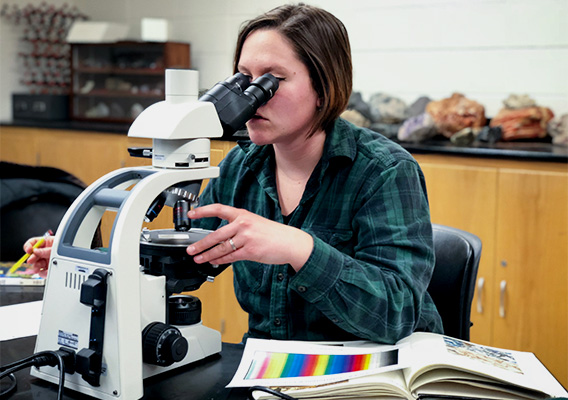
Skills and Learning Outcomes
- Design, implement and assess teaching tools.
- Communicate effectively with a range of audiences.
- Demonstrate proficiency in subject areas and apply it to the development of classroom materials and lessons.
- Understand students’ diverse needs and utilize tools to meet needs through instruction.
Types of Courses
- Apprentice Teaching Seminar
- Classroom Interactions
- Functions and Modeling
- Knowing and Learning in Math and Science
- Perspectives in Math and Science
- Project-based Instruction
- STEM Apprentice Teaching
- STEMteach
- Teaching STEM Reading in Secondary Schools
